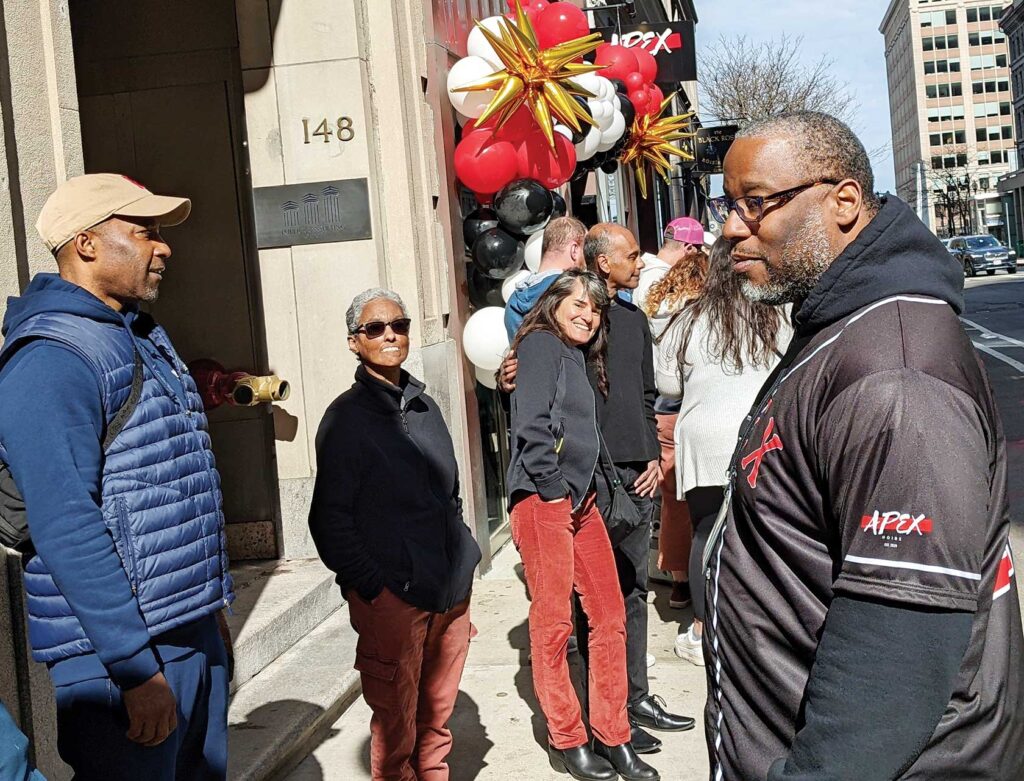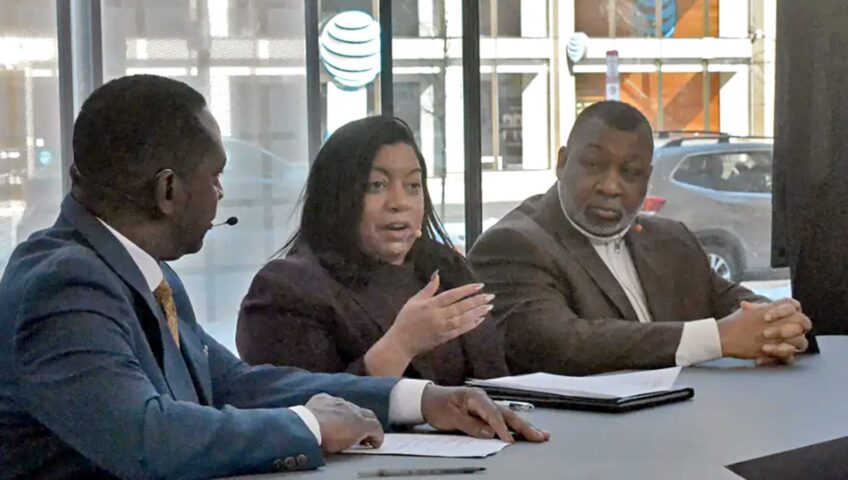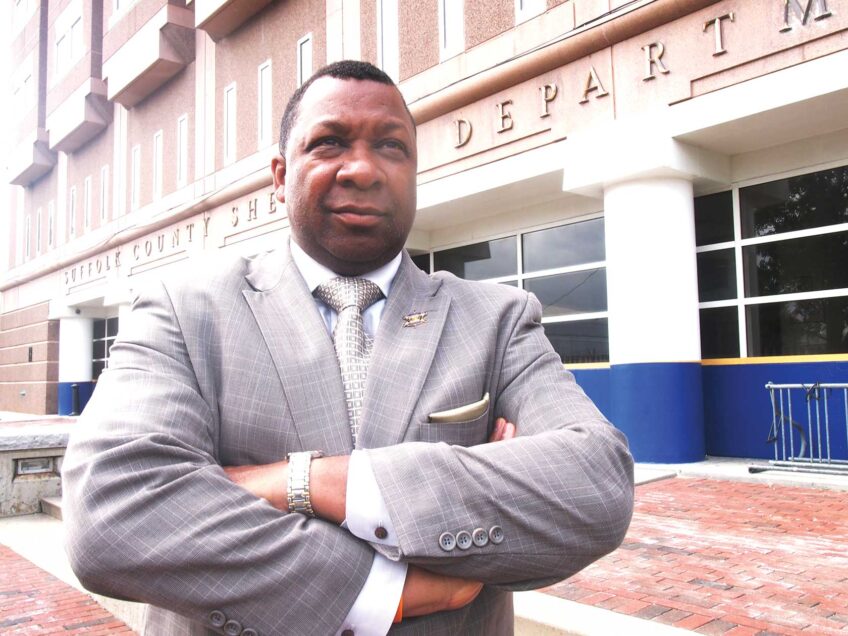Tito Jackson’s dispensary opens downtown
Business to include bar, rooftop lounge

Apex Noire, the cannabis dispensary headed by former City Councilor and mayoral candidate Tito Jackson, celebrated its grand opening Saturday.
The dispensary, situated in a seven-story building near Faneuil Hall, is the first Black-owned dispensary to open in downtown Boston and one of few Black-owned businesses to operate in the high-traffic area.
The grand opening marks an ambitious launch by Jackson and his partners, and one that has been some time in the making.
“It’s been a long road,” CEO and founder Jackson acknowledged, standing outside Apex Noire and greeting customers in a line that stretched down the block along State Street. “We thought we’d be open very quickly — it’s been three years. We are very, very proud.”

Former City Councilor Tito Jackson cuts the ribbon on Apex Noire, his seven-story cannabis dispensary on State Street, which includes a bar and a rooftop lounge. PHOTO: ISAIAH THOMPSON
The opening also sheds light on what some see as progress in efforts by the state’s Cannabis Control Commission (CCC) and the city of Boston to actively facilitate greater racial equity in the state’s burgeoning cannabis industry. A new state law passed last year requires Massachusetts municipalities to establish their own equity measures, and prevents people with prior convictions from being excluded from work in the cannabis industry. In Boston, city ordinance requires that one license be awarded to an equity applicant for every one that isn’t.
Apex Noire has been open for some two months now, but Saturday marked a symbolic milestone, with a ceremonial ribbon-cutting attended by investors, supporters and local officials, including several Boston city councilors. The event included a block party, food trucks and live music, as well as a private party on the dispensary’s rooftop bar — a swanky, intimate space with a view of the Custom House tower.
Apex Noire holds another approved license, in Medford, where Jackson hopes to open a second dispensary by the end of the year.
The Boston facility, meanwhile, promises to be “Boston’s first seven-story full-service experiential cannabis dispensary,” and hosts an in-house edible factory that will provide cannabis products not only to the dispensary itself but to others as well.
Jackson was also able to purchase a full liquor license enabling the dispensary to operate the first two floors as a bar and lounge, open for private events for now. (Sampling of cannabis products is not permitted on the property.) Jackson wants Apex Noire to be more than a pick-up-and-leave destination and hopes to be able to serve refreshments to the general public. He said the business is still working out partnerships to provide food and beverages on site.
“We’re located [near] Faneuil Hall … which draws nearly 18 million people a year to that location, so we know there is a very strong tourist business there, and we definitely anticipate being a welcoming place to those who are traveling,” said Jackson. “But in addition to that, we are an organization that was founded by someone who is from the community and we definitely value people who are from Boston, from the state of Massachusetts, and who might drive past a couple other dispensaries to come and have this experience.”
As the first Black-owned dispensary downtown, Jackson, said, “We are a bridge for all communities to the center of our city.”
As one elderly couple stopped to gape at the queue outside Apex Noire, Jackson swooped in, explaining that the line was for a dispensary — his dispensary, he told them, and jokingly warning: “You have to be 21 to come in!”
The couple left holding two of Jackson’s business cards.
Long road, inclusive hiring
Jackson struggled for years to secure a viable site and financing for a business that cannot access traditional bank loans, as well as to clear the many bureaucratic hurdles incumbent upon any venture seeking to open within the highly-regulated cannabis space in Massachusetts.
His investors so far are friends, family and colleagues, Jackson said. He hopes to open his fundraising to even smaller investors via a crowd-sourcing campaign yet to launch.
Bill Stearns is among those who chose to invest in the enterprise, along with his wife Stephanie Garrett-Stearns, who served as a campaign manager for Jackson.
“It’s exciting to see the city finally see some of the promises fulfilled in terms of equity in the cannabis industry,” said Stearns. “He’s doing the right thing, he’s doing all the right things to make us feel great about our investment — I think it’s going to be a great success.”
Jackson boasts that his staff of 20, including what he is calling his “cannabis connoisseurs,” are 80% people of color, and that 20% have a Massachusetts CORI record, meaning they have been involved at some point in the criminal justice system — statistics Jackson touts as evidence that the jobs are going to those communities most affected historically by the U.S. war on drugs.
“I am very pleased to have this amazing group of people. We had over 215 people apply for a staff of 20, so that really speaks to what we’re doing here,” Jackson said.
Jackson says staff are being hired at a minimum $17.50 per hour and that the dispensary is providing free financial literacy classes to staff.
“Tito has really made it a point to go above and beyond in terms of making sure he hires a staff that is all-inclusive and really seeking people who have experience in the cannabis industry, even legacy experience — prior to legalization,” Cannabis Control Commissioner Ava Callender Concepcion told the Banner. “He understands that not only is there an opportunity here, but also the fact that they are well-qualified and might have more experience than other people.”
At-large City Councilor Ruthzee Louijeune praised Jackson for “hiring people who have been traditionally on the other side when it comes to prosecution or possession … It is beautiful to see.”
At-large Councilor Julia Mejia said she was proud to attend the dispensary’s opening.
“I would like to see more of these types of dispensaries that are going to be sustainable and thrive,” said Mejia, who is sponsoring an upcoming hearing on diversity in Boston’s cannabis industry. “Unfortunately, Black and Latino communities that have been disproportionately impacted by the war on drugs are still being left out of the process.”
Heshan de Silva-Weeramuni, a former staffer for Jackson while he served on the Council, said Jackson’s management style reflects his values.
“He’s done what’s right by involving the community in his investment structures, in his hiring practices and in really making sure that he has brought everyone else along,” said de Silva-Weeramuni.
Equity still elusive statewide
As of this month, just under 10% of approved cannabis licenses statewide have gone to minority-owned businesses, according to the most recent figures available from the CCC — figures that largely reflect the status quo before the 2022 law requiring local equity initiatives.
“We have not seen the numbers [statewide] that I think were the intention behind legalization,” acknowledges Concepcion. “But I will say we’re hopeful under this new law, because now we are required, municipalities no have to have equity baked into their process across the board.”
Meanwhile, in Boston, more than half of recreational dispensary licenses awarded have gone to equity applicants, according to a recent report by NBC 10 Boston — a figure that likely reflects the Boston ordinance that prioritizes equity applicants.
“I think there’s been significant progress, and especially in the city of Boston,” said Shaleen Title, a former CCC commissioner and founder of the Parabola Center, a nonprofit aimed at increasing equity in the cannabis industry nationwide.
“In the first couple of years,” of cannabis legalization, Title said, “it was clear we weren’t doing enough. So I think those factors led the state and the City of Boston to enact an increasingly robust program that will continue … to be more robust going forward.”







